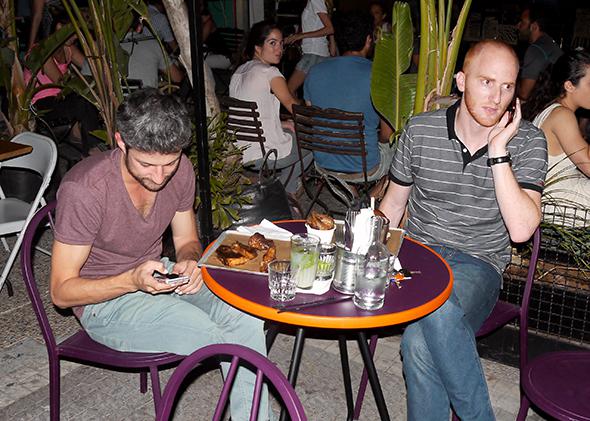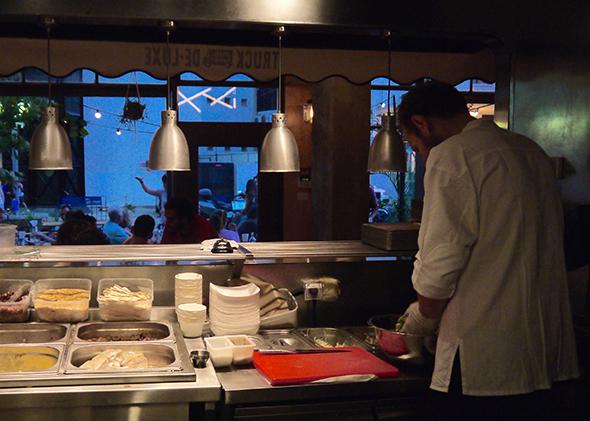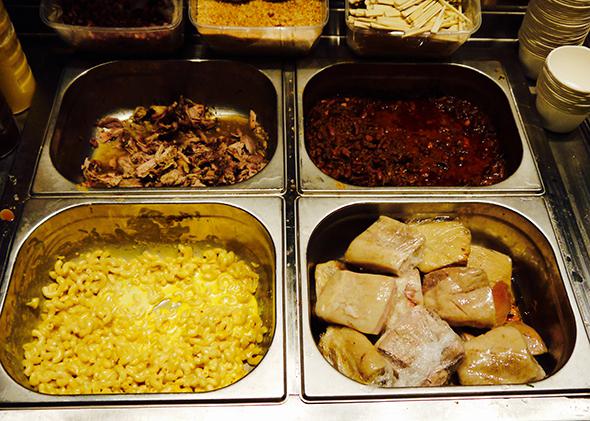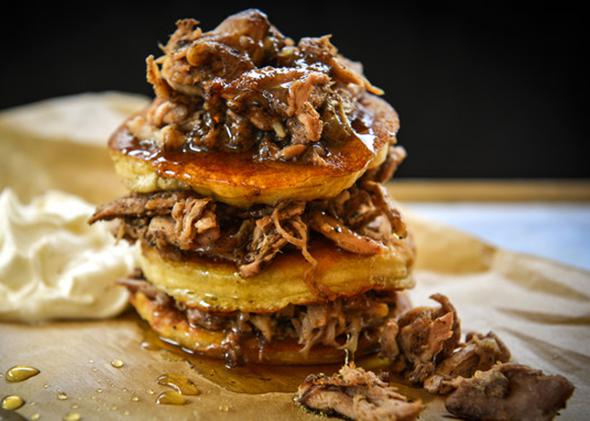TEL AVIV, Israel—As the sun sets on Tel Aviv’s Dizengoff Square, a nearby Kabbalah Center wraps up its outdoor lecture series, boutiques and galleries close up for the night, and beachgoers still in their bikinis park at the bike-share station. Nearby, normcore-clad hipsters are descending on one of the city’s only barbecue joints. They come in hordes for cocktails and soul food, but mostly for something that, while unremarkable in most cosmopolitan cities, has long been viewed as forbidden fruit in Israel: pork.
At Truck De Luxe, you can while away the hours on a patio that stretches into the street, tucking into a cold beer and a soft pretzel with bacon jam, or its signature pancake tower, which is layered with pulled pork and slathered with maple syrup. In the past five years, Israelis’ passion for pork has blown up, says one of the restaurant’s owners, Ori Marmorstein. And since the pork industry is monopolized by only a few pig farms, mostly in Israel’s northern Arab-Christian area, demand has made pork prices skyrocket almost 100 percent, he says, with some cuts up to about $8 per pound.

Truck De Luxe.
Photo by Afik Gabai
Marmorstein’s newest venture is Israel’s first American-style barbecue truck (actually, a truck parked inside a restaurant), inspired by the haunts of Williamsburg, Brooklyn. A stalwart atheist, he views the truck as part of a larger movement within Israel. He realizes that the hefty showing of pork on the menu repels some potential customers, who continue to see the food as taboo, but hopes that that will soon change. He blames Judaism, which forbids the consumption of pork, for the stark division between Tel Aviv, widely known as a secular “bubble,” and the rest of the country. “Religion ruins everything,” he says without much emotion.
Places like this are flashpoints in the long-brewing rivalry between Tel Aviv and the rest of the country. Many Israelis mock the cultural capital for being too millennial, too liberal, too globally minded—and, perhaps absurdly, given the tiny size and close-knit nature of the country—too disconnected from local realities. But at the truck, the staff is quintessentially Tel Aviv: beautiful, hedonistic, blasé, flirty young things who see good food and alcohol not as moments of gratification, but as a way of life. Ignoring the country’s loaded and increasingly depressing political scene is exactly the point, and pork is a means to that escape.

Photo by Shira Rubin
Though 32-year-old customer Michael Halin realizes that pork is still taboo here, growing up with secular immigrant parents from Belarus has meant it has always been a nonissue for him. “I don’t really care. For me, it reminds me of home,” he tells me before throwing back a shot and digging into a spareribs dinner.
“When I would come back from the army on the weekends, every Saturday my mother would make bacon and eggs.”
The pork debate has a long and contentious history in Israel. The proscription against eating pigs in the Bible, in Leviticus 11, states, “These are the creatures that you may eat from among all the land animals: any animal that has true hooves, and that chews the cud. … [T]he swine—although it has true hooves, with the hooves cleft through, it does not chew the cud: it is unclean for you.”
However, the controversy around pork, once euphemized as “white steak,” has, to a greater extent, been linked to Israel’s painful and complex process of identity building. Unlike other non-kosher foods, such as shrimp and shellfish, it has symbolized a history of humiliation and persecution in the collective Jewish consciousness. During the Spanish Inquisition, Jews were forced to choose between death and eating pork to pledge their allegiance to the church. Even in secular Jewish literature, pork is associated with guilt and a betrayal of the Jewish tradition and identity. Contemporary Jewish American poet Allen Grossman writes:
Pigs do not remember Jerusalem. I hunger
I have a hunger, as deep as the sea,
to forget Jerusalem. I commit my right
hand (all its famous cunning) to oblivion.
In the early days of the state, the question of integrating religious tradition into legislation was gravely important and deeply controversial. In December of 1948, just months after the establishment of the state, scarcity of meat and a general food shortage had some Israelis pushing for the import of non-kosher meats, saying that the state needed to prioritize protecting its people from hunger rather than from sin. However, opposition was vocal and widespread among both secular and religious Israelis in support of Immigration and Health Minister Moshe Shapira’s assessment that importing pig would amount to a “national crime.” In the early 1950s, Orthodox Jews attacked shops that sold pork, in addition to cars that drove on Saturday, the Jewish Sabbath.
Surprisingly, David Ben-Gurion, Israel’s first prime minister and a staunch secularist, opposed pork consumption. He viewed eating pork as a recent Jewish diasporic cultural development that Israelis needed to shed in order to forge a united Israeli identity. In 1962 the Knesset officially outlawed the breeding and selling of pigs, except for in Arab-Christian areas, such as the villages around Nazareth. In 1994 the import of non-kosher meat was also banned. That action, ironically, fortified what was once a black-market system of smuggling pork from the Arab-Christian pig farms into Jewish areas. Today that market is a legal, flourishing industry reliant almost exclusively on those few original farms.

Photo by Shira Rubin
While the fierce debate has historical roots, it has today reached new dimensions as the religious rift has grown in Israel. A few weeks ago, an American Israeli soldier was given an 11-day military prison sentence—eventually commuted—for bringing a ham sandwich onto his base, prepared for him by his grandmother, with whom he lives on a nearby kibbutz.
The soldier said he was unaware of the kosher regulations on the base, and while the army quickly reversed the punishment, it opened up a barely healed wound in the country’s uneasy religious-secular balance. Rabbi Eli Ben Dahan, the deputy defense minister, tweeted, “The state of Israel is a Jewish state, whose Jewish identity we strengthen.” Haaretz writer Rogel Alpher, however, said it was just the opposite—that kosher rules discriminated against secular Jews, and that, “In Israel, the kashrut [kosher establishment] culture is a culture of coercion, of wielding control over the population.”
“In Israel, I know a lot of people who don’t keep kosher, but who won’t eat pork, because of tradition or whatever it is,” says Inbal Baum, a former attorney and yoga instructor whose tour company, Delicious Israel, gives tours through Israel’s culinary hot spots. She grew up eating bacon for breakfast, which she says she and many Israelis and Jews abroad see as a lesser offense when compared with ham or pork chops. The taboo, she says, is linked more than anything else to the sentiment that pork is not eaten because that’s the way it has always been. But, she concedes, none of her family members would “disrespect” her grandmother—a 94-year-old survivor of Auschwitz from a religious Polish home—by bringing pork into the house.

Photo by Shira Rubin
The immigration of some 1.6 million Jews, many of them secular, from the former USSR in the 1990s introduced pork in a big way to mainstream Israeli cuisine, but Inbal says the recent pork trend also reflects a wider cultural opening among a new generation of Israelis. For many, backpacking for a year throughout Southeast Asia or South America following the mandatory year of military service is seen as a rite of passage. However, Israelis are increasingly interested in exploring the food cultures they encounter and in trying to replicate new flavors once they return home. In her food tour of Tel Aviv, Inbal walks through the city’s central outdoor market, where bok choy, green papaya, and Asian and South American spices have appeared alongside pork.
And while Truck De Luxe has a distinctly international feel, other chefs are integrating pork into traditional Jewish cooking. At Hahalutzim 3, in the trendy Florentine neighborhood of south Tel Aviv, the conventional Jewish kitchen is updated with dishes such as challah rolls stuffed with spiced pork leg.
Leehee Goldenberg, an Israeli food blogger, is a fan of the restaurant’s style, but also describes her relationship with pork as both rapturous and guilt-ridden. “I remember when I was a little kid,” she writes on her blog, “my maternal grandfather used to reminisce about eating pork fat drippings on a piece of crusty bread—something he gave up when he married my grandmother, who came from a religious family.” Goldenberg describes being sickened when she tried pork for the first time as a teen, a condition she now says was psychosomatic. “Today, I am in love with the other white meat,” she writes.

Photo by Afik Gabai
While the consumption of pork is becoming more mainstream, the production of it by Jews is still rare and sometimes still requires some justifying loopholes. Kibbutz Lahav in southern Israel, which, like many kibbutzim, started as a radically secular project, is the only one of its kind to contribute to Israel’s pork industry, albeit as a byproduct of a program to breed lab animals. Because pigs are physiologically similar to humans, they are the best animals for medical research, explains Moshe Tayar, a kibbutznik and spokesman for the kibbutz’s research institute, where they work to advance treatments for ailments ranging from diabetes to various types of cancer. Excess pigs are processed at the kibbutz factory, which sells to shops and hotels around the country.
Their workers include observant Muslims and Jews who don’t eat pork themselves, explains Tayar. (In a rare example of Muslim-Jewish agreement among Israelis, Islam also views “swine” as a particularly unhygienic and thus spiritually toxic animal, and its consumption is explicitly deemed “haram,” or forbidden, in the Quran.) Because he didn’t grow up with it at home, he abstains from pork, but would never forbid his children from eating what they like. His tone is slightly hostile toward the very idea that he would do so. He says that it’s not the business “of the religious establishment or of anyone else to go into my plate, to see what I’m eating!” and adds that the raising of pigs has been a part of the community’s landscape and culture since its founding in 1952.
“I believe in a pluralism of ideas, to each his own,” he says. “No one has the right to say otherwise.”
